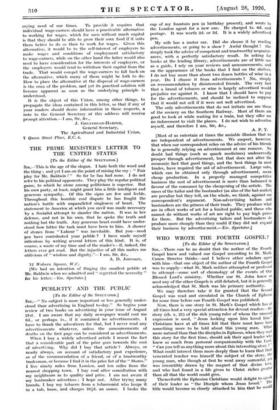PUBLICITY AND THE PUBLIC
[To the Editor of the SPECTATOR.] SIR,—" No subject is more important or less generally under- stood than advertising in England to-day." So begins your review of two books on advertising in your issue of August 21st. I am aware that my daily newspaper would cost me 6d., or perhaps 1s., if it contained no advertisements. I have to thank the advertisers for that, but I never read any advertisements whatever, unless the announcements of deaths on the first page can be considered as advertisements.
When I buy a widely advertised article I resent the fact that a considerable part of the price goes towards the cost of adverthing. Why did I buy that article ? Always, or nearly always, on account of satisfactory past experience, or of the recommendation of a friend, or of a trustworthy tradesman, or because I find it in the price list of the " Stores." I live ninety miles from London, and ten miles from the nearest shopping town. I buy coal after consultation with my neighbours as to quality and price. I am not aware if my bobtmaker advertises ; I hope not. After trying many brands, I buy my tobacco from a tobacconist who keeps it in a tub, loose, and charges 100. an ounce. I broke the cap of my fountain pen (a birthday present), and wrote to the London agent for a new one. He charged ls. 6d. and postage. It was worth 2d. or 3d. It is a widely advertised pen.
My wife has a motor car. Did she choose it by reading advertisements, or going to a show ? Awful thought ! She simply took the advice of competent and trustworthy acquaint. ances, with a perfectly satisfactory result. In asking for books at the lending library, advertisements are of little use as a guide, I rely on your reviews and announcements, and on the appearance of the books that I find on the shelves. I do not buy more than about two dozen bottles of wine in a year. Do I choose it from advertisements ? No, simply on recommendation by disinterested friends. The very fact that a brand of tobacco or wine is largely advertised would prejudice me against it. I know that I should have to pay for the advertisements, and should be inclined to suppose that it would not sell if it were not well advertised.
The only advertisements that do not irritate nie are those of the scenery on the Southern Railway. Most of them are good to look at while waiting for a train, but they offer me no inducement to visit the places. I do not wish to advertise myself, and therefore I am, Sir, &c., A. P. T.
[Most of us entertain at times the amiable illusion that we are independent of advertisements. We suspect, however, that when our correspondent relies on the advice of his friends he is generally relying on advertisement at one remove. No doubt bad things (such as quack medicines) undeservedly prosper through advertisement, but that does not alter the economic fact that good things, and the best things in most trades, have required the aid of advertisement. Large sales, which can be obtained only through advertisement, mean cheap production. In a properly managed competitive business the cost of advertisement is more than balanced in favour of the consumer by the cheapening of the article. The cases of the tailor and the bootmaker (as also of the hat-maker) are peculiar but they tell, on the whole, we think, against our correspondent's argument. Non-advertising tailors and bootmakers are the princes of their trade. They produce what are in effect works of art for a limited public, and those who cannot do without works of art are right to pay high prices for them. But the advertising tailors and bootmakers do produce more cheaply than they could if they did not excand their business by advertise ment.—En. Spectator.]






































 Previous page
Previous page